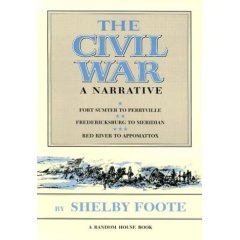
("history has a plot")
History is a story, after all, and so it’s no surprise that people enjoy history most when it's told by a talented story teller. Shelby Foote’s 3-volume masterpiece, The Civil War, A Narrative, has no footnotes, and no bibliography. But students of the Civil War do not fault Foote for that, because the music of his narrative is mesmerizing, and the scope of his epic so grand. Foote himself explained, “I thought the footnotes would cost me more artistically than they would gain me in academic respect.” And he was right, but don't try this at home.
This is not to say that more military historians or authors should dispense with footnotes or bibliographies. We could hardly take them seriously if they did. But Foote’s comments on melding artistic sensibilities with Civil War scholarship are interesting to consider. Much of today’s Civil War fare is so formulaic and dull, plowing through to the end is a tedious chore. When a book begins to feel like an onerous assignment, I quickly lose interest. It's dismaying to see how many historians can take a subject as spectacularly gripping as the Civil War era in America, and denude it of all drama, all human interest. Post-graduate training and the academy certainly demand rigorous standards, but suffocating the life out of the material is not one of them.
Nor is all this to say that more military historians should take liberties, such as attributing thoughts or feelings to historic figures when those thoughts and feelings are not in evidence. [I remember receiving a copy of a much anticipated biography of Richard Ewell — much anticipated because there were none (this before Pfanz’s excellent tome filled that gaping biographical hole), and slamming it shut with bitter disappointment after encountering one too many descriptions of an officer’s imagined facial expression, or fabricated dialogue]. Infusing a work of history with the basic elements of a story doesn’t mean turning non-fiction into fiction. It means making it readable.
Here are a few excerpts of Shelby Foote’s novelist-as-historian commentary from his 9/11/94 appearance on CSPAN’s BookTV, the transcript of which is here.
I have a strong belief that novelists have a great deal to teach historians about plotting, about character drawing, about other things, especially the concern about learning to be a good writer, which many historians don't bother to do. I was happy the whole time. I never felt really different writing a history from what I'd felt writing novels.
I believe that the artists are out front and have a great deal to teach historians about good writing and dramatic composition, which I consider the best history to be. Aristotle said, in criticizing great drama, that first you learn how to write well -- a good sophomore in high school can do a surprisingly good description of a sunset — then you learn to draw characters that can stand up and cast a shadow, and the last thing you learn to do is plot. That's the skill that comes last, if it comes at all.
That is where I think historians neglect a huge advantage. I think history has a plot. You don't make it up; you discover it. It's there. Oscar Wilde talks about life imitating art. I have noticed that when a man dies, no matter at what age or by what cause, his life then has a beginning and a middle and an end, and sometimes his death explains his youth. Good friends of mine who were killed in the war spent their youth exactly as if they knew they were going to be killed. It's a very strange business, but that's art taking over, insisting on giving a thing form when it seems to be formless. I think that when you supply that form — and, mind you, I'm not talking about superimposing it; I'm talking about discovering the form — it makes that a very exciting reading experience.
-- discuss it here
No comments:
Post a Comment